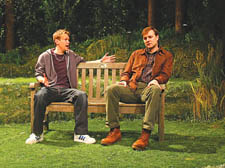|
|
 |
| |

Brothers Drew (Steven Mackintosh) and Terry (David Morrissey) |
Flicker of hope in a dark, dark place
IN A DARK DARK HOUSE
ALMEIDA theatre
NEVER one to let an old wound heal or a sleeping dog lie, American playwright Neil Labute (In the Company of Men) pedals a particular brand of misanthropy; his work is regarded as brilliant, devastating, hateful or sadistic, depending on where you’re standing.
For those still wondering what the disposition of his latest play might be, the clue is in the title. Dark. Dark dark.
Labute’s tale of sexual abuse and painful home truths by way of dinner parties and pitch’n’putt begins where most stories end – in rehab. Brothers Terry and Drew meet in the manicured gardens of a private hospital, joshing each other about “being homo”, playfighting aggressively, talking around the obvious question. Only one is there of his own volition.
Terry – a fantastic, full-blooded performance by David Morrissey – is gruff and fatherly; the obvious concern he has for his baby brother comes through intermittently in squalls of anger or remorse.
Steven Mackintosh’s Drew is stuck between two places too: on one wrist he sports a thick silver watch, a trophy of his coked-up lawyer lifestyle; on the other he rubs a medical admission band. He is trying, he claims, “to get back on the straight and whatever”.
Through his faltering surfer-dude lexicon, Drew reveals the bare bones to his brother: the father who beat him, the man who abused him, the secrets which have torn him apart.
But how much of this is Drew’s own suffering, and how much has he borrowed from the quiet, lowering Terry?
Across Lex Brotherston’s lush, vernal set and three straight-talking scenes, the play painstakingly reopens the scars of abuse, exploring the nature of truth and experience. Is it always as simple as victim and abuser? Is it really possible to break the cycle? When 15-year- old Jennifer (Kira Sternbach) is introduced in the second act, the discomfort is almost too much to bear.
This is deeply personal terrain for Labute, who was himself abused as a child. We can, on occasion, forgive him if he likes the sound of his own dialogue, or when he chooses the sensational over the mundane.
Truth hurts in his plays, though here his trademark fascination with the evil that men do is tempered with a slight flicker of hope, of perserverance, between the two men – one hollow, one haunted – on whom the stage lights dim.
Until January 17
020 7359 4404 |

|
 |
|
|
 |
|



